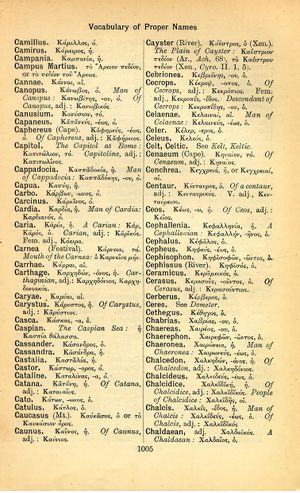Ceramicus: Difference between revisions
From LSJ
Πολλὰ τὰ δεινὰ κοὐδὲν ἀνθρώπου δεινότερον πέλει → There are many wondrous things in this world, but none more wondrous than humans
(Names) |
(6_3) |
||
| Line 1: | Line 1: | ||
{{WoodhouseENELnames | {{WoodhouseENELnames | ||
|Text=[[File:woodhouse_1005.jpg|thumb|link={{filepath:woodhouse_1005.jpg}}]]Κεραμεικός, ὁ. | |Text=[[File:woodhouse_1005.jpg|thumb|link={{filepath:woodhouse_1005.jpg}}]]Κεραμεικός, ὁ. | ||
}} | |||
{{Lewis | |||
|lshtext=<b>Cĕrămīcus</b>: a, um, v. [[Ceramus]].<br /><b>Cĕrămīcus</b>: i, m., = Κεραμεικός (the [[pot]]-[[maker]]),<br /><b>I</b> the [[name]] of [[two]] places, one [[within]] and the [[other]] [[without]] [[Athens]]; in the [[latter]] were the monuments and statues of heroes [[that]] had [[fallen]] in [[war]], Cic. Fin. 1, 11, 39; id. Leg. 2, 26, 64; Attic. ap. Cic. Att. 1, 10, 1; Plin. 36, 5, 4, § 20; 37, 12, 45, § 155 (cf. Pausan. 1, 29, 2 Siebel. and Meurs. in Thes. Gron. iv. p. 1006 sq.). | |||
}} | }} | ||
Revision as of 08:24, 13 August 2017
English > Greek (Woodhouse)
Κεραμεικός, ὁ.
Latin > English (Lewis & Short)
Cĕrămīcus: a, um, v. Ceramus.
Cĕrămīcus: i, m., = Κεραμεικός (the pot-maker),
I the name of two places, one within and the other without Athens; in the latter were the monuments and statues of heroes that had fallen in war, Cic. Fin. 1, 11, 39; id. Leg. 2, 26, 64; Attic. ap. Cic. Att. 1, 10, 1; Plin. 36, 5, 4, § 20; 37, 12, 45, § 155 (cf. Pausan. 1, 29, 2 Siebel. and Meurs. in Thes. Gron. iv. p. 1006 sq.).

